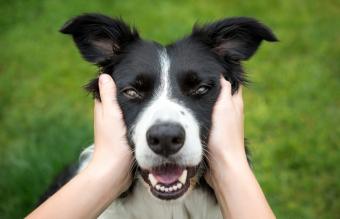
The Basenji isn't your typical dog breed. This clever creature acts more like a cat than a dog with an aloof yet endearing personality. If you're prepared to dedicate the time required to training and exercising your little spitfire, the Basenji may be the perfect companion for you.
Origin of the Unusual Basenji
Basenjis are considered one of the oldest dog breeds, as their origin can be traced back to the height of ancient Egyptian civilization. The breed almost became extinct with the fall of Egypt itself, but a small population of Basenjis were preserved in the heart of Africa, where they were developed into a highly skilled hunting breed.
Early attempts to import the breed to England and America largely failed due to bouts of distemper. Eventually, a viable breeding pair was brought together in Boston, and the Basenji began to gain a foothold with the American public.
Basenji Characteristics
There are many attributes that make this breed unique.

Physical Appearance
Basenjis are on the small side and are considered to be one of the smallest hound breeds today. They typically stand about 17 inches tall at the shoulder and weigh around 24 pounds. Males are slightly larger than females. These dogs are short-backed and slightly taller on leg, with tails held tightly curled over the rear.
The overall picture is that of a lean but muscular canine who can move with speed, grace, and agility. Their heads taper to a medium length muzzle and they have naturally erect ears. A Basenji's forehead is covered in a series of wrinkles that can give these dogs quite a range of expressions.
Very little grooming is required for this breed. The typical coat is short and smooth and comes in a variety of colors and markings. Many of these dogs have white feet or legs. You can find Basenjis in the following coat varieties.
- Chestnut red
- Black
- Tricolor - A combination of red, black, and white
- Brindle and white
Temperament
These are extremely intelligent little dogs, but they definitely have their own agenda. Basenji personalities are said to be more like cats than dogs, as they live to serve no human. Devotees find this quality one of the breed's strongest attractions.
This breed is often on high alert, which makes them great watchdogs, and while they are affectionate toward their owners, they tend to be aloof with strangers. They can become quite destructive if not given the attention they demand.
Exercise Requirements
A tired Basenji is a happy Basenji. These dogs have moderate to high exercise needs and can act out if they're not stimulated enough. They need both physical and mental exercise in the form of games, engaging walks, play sessions, and socialization.
Training
These dogs are inherently different from other breeds. Their extremely independent nature makes them fascinating creatures, but not very obedient ones. Basenjis are typically poor candidates for obedience training and are not easily housebroken. In fact, they present about twice the challenge to adequately train as a Jack Russell Terrier does, and anyone who owns a JRT will tell you they aren't a breed for a novice dog owner.
That said, there is an irresistible charm about Basenjis that draws adventurous dog lovers to them like moths to the proverbial flame. Proud owners will actually compare notes on the amount of damage and destruction their pets have racked up. The simple fact is, your Basenji is far more likely to train you to put up with their eccentric behavior than you are to train them away from it.
Health Concerns
These dogs are normally quite healthy, but as with most breeds, they are susceptible to several health concerns.

- Eye problems (progressive retinal atrophy or corneal dystrophy)
- Umbilical hernias
- Thyroid problems
- Canine hip dysplasia
- Fanconi Syndrome (a type of kidney disorder)
- Hemolytic anemia
Responsible breeders make every effort to screen affected dogs out of their breeding programs, and most offer a replacement guarantee in the event a puppy develops one of these disorders later on.
Lifespan
Like many smaller dogs, Basenjis typically live long and full lives. Their average lifespan is approximately 13 years, although the oldest recorded Basenji lived to nearly 18 years old.
Fun Facts
The breed is largely known for the fact that it doesn't bark, or at least not in the usual sense. This in no way means the breed is a silent one. Most individuals are capable of making a strange sort of yodel that is unique to the Basenji breed.
Buying or Adopting a Basenji
If you've decided that the Basenji is the right dog for you, there are numerous ways to go about acquiring one. You could purchase a Basenji from a reputable breeder or find a dog through a dedicated Basenji rescue. Your local shelter or a national rescue group may have purebred or mixed-breed Basenjis available for adoption as well.
Conclusion
So, now that you've had an introduction to the little powerhouse that is the Basenji, what do you think? Are you ready to consider a completely different dog breed, or are you genuinely intrigued by the Basenji's peculiar character? If you still find you'd like to get to know the breed better, there's a clever Basenji out there for you.







